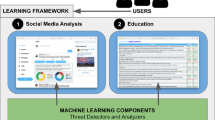Abstract
Media resources in social Web spaces trigger social interactions, as they consist of motivating means to create and exchange user-generated content. The massive social content could provide rich resources towards deriving social profiles to augment user models and improve adaptation in simulated learning environments. However, potentially valuable social contributions can be buried within highly noisy content that is irrelevant or spam. This paper sketches a research roadmap toward augmenting user models with key user characteristics derived from social content. It then focuses on the first step: identifying relevant content to create data corpus about a specific activity. A novel, semantically enriched machine learning approach to filter out the noisy content from social media is described. An application on public comments in YouTube on job interview videos has been made to evaluate the approach. Evaluation results, which illustrate the ability of the approach to filter noise and identify relevant social media content, are analysed.
Access this chapter
Tax calculation will be finalised at checkout
Purchases are for personal use only
Preview
Unable to display preview. Download preview PDF.
Similar content being viewed by others
References
Agarwal, N., Liu, H.: Modelling and Data Mining in Blogosphere. In: Grossman, R. (ed.) Synthesis Lectures on Data Mining and Knowledge Discovery, vol. 1. Morgan & Claypool Publishers (2009)
Agichtein, E., Castillo, C., Donato, D., Gionis, A., Mishne, G.: Finding high-quality content in social media. In: Proceedings of the International Conference on Web Search and Web Data Mining (WSDM), Palo Alto, California, USA (2008)
Chung, S.F., Kathleen, A., Chu-Ren, H.: Using WordNet and SUMO to Determine Source Domains of Conceptual Metaphors. In: Proceedings of 5th Chinese Lexical Semantics Workshop (CLSW-5), pp. 91–98. COLIPS, Singapore (2004)
Despotakis, D.: Multi-perspective Context Modelling to Augment Adaptation in Simulated Learning Environments. In: Konstan, J.A., Conejo, R., Marzo, J.L., Oliver, N. (eds.) UMAP 2011. LNCS, vol. 6787, pp. 405–408. Springer, Heidelberg (2011)
Feldman, R.: Text Mining Handbook: Advanced Approaches in Analyzing Unstructured Data. Cambridge University Press, New York (2006)
Kamaliha, E., Riahi, F., Qazvinian, V., Adibi, J.: Characterizing network motifs to identify spam comments. In: IEEE International Conference on Data Mining Workshops, ICDMW 2008, pp. 919–928 (2008)
Kibriya, A.M., Frank, E., Pfahringer, B., Holmes, G.: Multinomial Naive Bayes for Text Categorization Revisited. In: Webb, G.I., Yu, X. (eds.) AI 2004. LNCS (LNAI), vol. 3339, pp. 488–499. Springer, Heidelberg (2004)
Kolb, P.: DISCO: A Multilingual Database of Distributionally Similar Words. In: Proceedings of KONVENS-2008, Berlin (2008)
Kotsiantis, S.B.: Supervised Machine Learning: A Review of Classification Techniques. Informatica 31, 249–268 (2007)
Metsis, V., Androutsopoulos, I., Paliouras, G.: Spam filtering with naive bayes - which naive bayes? In: 3rd Conference on Email and Anti-Spam CEAS (2006)
Schimratzki, O., Bakalov, F., Knoth, A., König-Ries, B.: Semantic Enrichment of Social Media Resources for adaptation. In: Proceedings of International Workshop on Adaptation in Social and Semantic Web (SAS-WEB 2010), Big Island of Hawaii, pp. 31–41 (2010)
Siersdorfer, S., Chelaru, S., Nejdl, W., Pedro, J.S.: How useful are your comments?: analyzing and predicting YouTube comments and comment ratings. In: Proceedings of the 19th International Conference on World Wide Web, Raleigh, North Carolina, USA, pp. 26–30 (2010)
Smeeton, N.C.: Early History of the Kappa Statistic. Biometrics 41, 795 (1985)
Turney, P.: Learning algorithms for keyphrase extraction. Information Retrieval 2(4), 303–336 (2000)
Wang, F.Y., Carley, K.M., Zeng, D., Mao, W.: Social computing: From social informatics to social intelligence. IEEE Intell. Syst. 22(2), 79–83 (2007)
Witten, I., Frank, E.: Data Mining: Practical Machine Learning Tools and Techniques. Morgan Kaufmann Publishers, San Francisco (2005)
Zhu, L., Sun, A., Choi, B.: Online spam-blog detection through blog search. In: Proceedings of the Seventeenth ACM International Conference on Information and Knowledge Management (CIKM), pp. 1347–1348 (2008)
Author information
Authors and Affiliations
Editor information
Editors and Affiliations
Rights and permissions
Copyright information
© 2012 Springer-Verlag Berlin Heidelberg
About this paper
Cite this paper
Ammari, A., Dimitrova, V., Despotakis, D. (2012). Identifying Relevant YouTube Comments to Derive Socially Augmented User Models: A Semantically Enriched Machine Learning Approach. In: Ardissono, L., Kuflik, T. (eds) Advances in User Modeling. UMAP 2011. Lecture Notes in Computer Science, vol 7138. Springer, Berlin, Heidelberg. https://doi.org/10.1007/978-3-642-28509-7_8
Download citation
DOI: https://doi.org/10.1007/978-3-642-28509-7_8
Publisher Name: Springer, Berlin, Heidelberg
Print ISBN: 978-3-642-28508-0
Online ISBN: 978-3-642-28509-7
eBook Packages: Computer ScienceComputer Science (R0)




